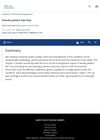Hair Loss in Women: Comprehensive Overview and Emotional Impact
January 2016
hair cycle anagen telogen hair-pull test androgenic female pattern hair loss nutritional deficiencies hypothyroidism antigliadin antibodies gluten intolerance blood glucose regulation antioxidants saw palmetto extract vitamin C vitamin E zinc vitamin A essential fatty acids iron alopecia areata celiac disease human anti-tissue transglutaminase antibodies hair growth phase hair resting phase female pattern baldness low thyroid function gluten antibodies blood sugar control saw palmetto omega-3 fatty acids patchy hair loss tTG antibodies

TLDR The document concludes that hair loss in women is complex, often linked to aging, health conditions, and nutritional deficiencies, and emotional impacts should not be underestimated.
The document from 2016 provides a comprehensive overview of hair loss in women, emphasizing the importance of not underestimating the emotional impact of this condition. It details the physiology of the hair cycle, including the growth (anagen), resting (telogen), and migratory phases, and notes that hair loss is a normal part of aging, with growth slowing by age 40. The hair-pull test is described as a method to determine the percentage of hair follicles in the telogen state, with a frequency of up to 25% being typical. Various causes of hair loss are discussed, including androgenic female pattern hair loss, side effects of drugs, nutritional deficiencies, hypothyroidism, and antigliadin antibodies related to gluten intolerance. The document suggests interventions such as improving blood glucose regulation, increasing antioxidant intake, and considering supplements like saw palmetto extract, vitamins C and E, zinc, vitamin A, essential fatty acids, and iron when deficiencies are present. It also mentions the potential role of hypothyroidism and gluten intolerance in hair loss, with the latter possibly leading to alopecia areata. Diagnostic features of celiac disease are also provided, including symptoms and the recommendation for testing for human anti-tissue transglutaminase antibodies for greater sensitivity.














